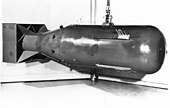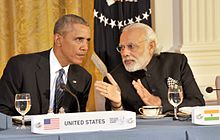| This article's lead section may be too short to adequately summarize the key points. Please consider expanding the lead to provide an accessible overview of all important aspects of the article. (March 2016) |
| 2016 Nuclear Security Summit | |
|---|---|
 | |
| Host country | United States |
| Date | March 31 – April 1, 2016 |
| Venue(s) | Walter E. Washington Convention Center |
| Cities | Washington, D.C. |
| Participants | 58 representatives |
| Follows | 2014 Nuclear Security Summit |
| Website | www |
| Nuclear weapons |
|---|
 |
| Background |
| Nuclear-armed states |
|
The 2016 Nuclear Security Summit was a summit held in Washington, D.C., United States on March 31 and April 1, 2016. It was the fourth edition of the conference, succeeding the 2014 Nuclear Security Summit.
Background
| This section needs expansion. You can help by adding to it. (March 2016) |
The 2016 Nuclear Security Summit was held at the Walter E. Washington Convention Center in Washington, D.C., in the United States of America.
Participants


Notably absent from the summit were leaders or representatives of Russia, North Korea, Iran and Belarus. However, a significant contingent of Asian leaders especially from South Asia such as India and Singapore attending the summit was a probable sign of continental concern over terrorist threats alongside vulnerable nuclear facilities.
Announcements

Various countries, including Kazakhstan and Poland, undertook to reduce their highly enriched uranium stockpiles. Japan agreed to ship additional separated plutonium to the U.S. Canada pledged $42 million to bolster nuclear security. The U.S. disclosed its own inventory of highly enriched uranium has dropped from 741 metric tons in the 1990s to 586 metric tons as of 2013. A strengthened nuclear security agreement, which had languished since 2005, was finally approved, extending safeguards for nuclear materials and requiring criminal penalties for nuclear smuggling. According to the U.S., since the last summit in 2014, ten nations have removed or disposed of about 450 kilograms of highly enriched uranium; Argentina, Switzerland and Uzbekistan are now free of highly enriched uranium, as is all of Latin America and the Caribbean.
The summit participants stated that the 2016 summit would be "the last of this kind".
Three months after the meeting, NPCIL and Westinghouse agreed to conclude contractual arrangements for 6 reactors by June 2017.
See also
References
- "White House Press Call: Previewing the Nuclear Security Summit". Retrieved March 31, 2016.
- "2016 Nuclear Security Summit". Retrieved March 31, 2016.
- "ISIS threat raises stakes for US Nuclear Security Summit". AFP. March 30, 2016. Retrieved March 31, 2016.
- Au Yong, Jeremy (March 28, 2016). "Close watch on nuclear security". Retrieved March 31, 2016.
- "Participating Country and International Organization Delegations" (PDF). Retrieved March 31, 2016.
- "PM Narendra Modi To Embark on 3-Nation Visit March End". NDTV. Retrieved February 29, 2016.
- Au Yong, Jeremy (March 30, 2016). "PM Lee visits Sept 11 memorial in New York". Retrieved March 31, 2016.
- "Nuclear Security Summit: What's at stake". AFP. March 30, 2016. Retrieved March 31, 2016.
- "VN to join nuclear security summit". Retrieved March 30, 2016.
- "Barack Obama's final attempt to safeguard nuclear stockpiles". The Economist. April 3, 2016. Retrieved April 2, 2016.
- Matt Kwong (April 2, 2016). "Trudeau, Obama tout commitments at close of Nuclear Security Summit". CBC News. Retrieved April 3, 2016.
- ^ "World leaders urge action against terrorism at Nuclear Security Summit". PBS NewsHour. April 2, 2016. Retrieved April 3, 2016.
- "Obama touts removal of highly enriched uranium". USA TODAY. April 2, 2016. Retrieved April 3, 2016.
- "U.S. Firm to Build Six Nuclear Reactors in India". Wall Street Journal. June 7, 2016.